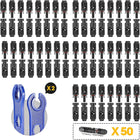How to Choose the Best Solar Battery

Choosing the right solar batteries for your solar panel system can be challenging due to the variety of technologies available on the market today. This guide will provide essential tips for selecting the best battery for your off-grid solar system.
How Do Solar Batteries Work?
Solar batteries work by converting the direct current (DC) electricity produced by the solar panels into stored chemical energy. When needed, this stored energy is then converted back into alternating current (AC) electricity for use in homes or on the road. This allows for a consistent power supply even during cloudy days or at night. To integrate batteries into your solar installation, you need solar panels, a charge controller, and an inverter.
Five Steps to Pick the Best Solar Battery
Step 1: Calculate Your Energy Consumption
Before selecting a solar battery, it’s crucial to understand your energy requirements. Estimate the total watt-hours you will need per day by considering the devices and appliances you plan to use. You can use the online solar load calculator to calculate your daily energy consumption.
Step 2: Check Your Solar System Voltage
Solar power systems are usually designed to operate at 12V and 24V. Panels, solar panel batteries, and inverters each come with those specifications.
For smaller energy needs (0 to 1000 watts), such as RVs, camper trailers, or small cabins: A battery with a capacity of 100Ah to 200Ah is recommended.
Example: If your daily energy consumption is 1,200 watt-hours (Wh), you would need a 12V, 100Ah battery (12V × 100Ah = 1,200Wh).
For medium energy needs (around 1,000 to 5,000 watts), such as medium-sized homes or small off-grid systems: A battery with a capacity of 100Ah to 200Ah is recommended.
Example 1: If your daily energy consumption is 2,400Wh, you would need a 24V, 100Ah battery (24V × 100Ah = 2,400Wh).
Example 2: If your daily energy consumption is 4,800Wh, you would need a 24V, 200Ah battery (24V × 200Ah = 4,800Wh).
Step 3: Pick a Battery Type
The two main types of solar batteries are LiFePO4 (lithium iron phosphate) batteries and lead acid batteries. Lead acid batteries include sealed (SLA), flooded, gel, and AGM batteries. Here’s a clear comparison of them:
|
Aspect |
LiFePO4 Batteries |
Lead Acid Batteries |
|
Cycle Life |
Longer cycle life (typically 2000-5000 cycles) |
Shorter cycle life (typically 300-500 cycles) |
|
Depth of Discharge (DoD) |
Higher usable DoD (can often discharge up to 100%) |
Lower usable DoD (typically 50% to extend battery life) |
|
Weight |
Lighter weight per kWh |
Heavier weight per kWh |
|
Maintenance |
Low maintenance |
Requires periodic maintenance (e.g., topping up with distilled water for flooded batteries) |
|
Charging Efficiency |
Higher charging efficiency |
Lower charging efficiency, especially for flooded batteries |
|
Temperature Performance |
Better performance in extreme temperatures |
Sensitive to temperature extremes |
|
Cost |
Higher initial cost |
Lower initial cost |
|
Safety |
Generally safer (less prone to thermal runaway) |
More sensitive to overcharging and mishandling |
To learn more about the pros and cons of each battery type, and how large of a battery bank to have, refer to our Blog Post on types of 12V batteries.
Step 4: Pick a Depth of Discharge
Now that you've selected your battery type, it's important to choose your target Depth of Discharge (DoD). This determines how much of the battery's total capacity you use. For lead acid batteries, the standard DoD is 50% to extend battery life. For LiFePO4 batteries, it's common to use a DoD of 100%.
Step 5: Consider a Higher Cycle Life
When choosing solar batteries, the cycle life refers to the number of charge-discharge cycles a battery can undergo before its capacity drops to a specified level. For optimal performance and longevity in solar applications, it's advisable to select batteries with a higher cycle life, typically measured in cycles (e.g., 4000 cycles at 80% depth of discharge), as this indicates better durability and longer-lasting energy storage capabilities.
Other Considerations
Efficiency: Higher efficiency means less energy is lost during the charging and discharging process. Opt for batteries with an efficiency of 90% or higher to maximize energy usage.
Portability: For travelers, the size and weight of the battery are critical. A portable, lightweight battery is easier to transport and install.
Cost: While cost is an important factor, focus on the overall value rather than just the initial price. Consider the battery's lifespan, efficiency, and maintenance requirements.
When it comes to choosing a battery for your RV solar panels, we typically recommend LiFePO4 batteries because of their high efficiency and lifespan. BougeRV 1280Wh solar battery is built using premium LiFePO4 technology and boasts over 4000 recharge cycles, 100% discharge rate, and a 10-year lifespan, which can meet your special needs for brilliant outdoor adventures.
Conclusion
Choosing the best solar battery for your needs involves balancing various factors, including your energy needs, system voltage, battery type, capacity, lifespan, efficiency, and cost. By carefully considering each of these aspects, you can ensure a reliable and efficient power source for your off-grid system.
FAQs:
1. What factors affect the performance of solar batteries?
Performance is influenced by battery type, efficiency, capacity, and environmental conditions. LiFePO4 batteries generally perform better in various temperatures and have higher efficiency compared to lead-acid batteries.
2. Can I use a solar battery with different voltages in my system?
It’s essential to match the battery voltage with your solar system's voltage. Using a battery with an incorrect voltage can damage the system or result in inefficient performance.
3. How often should I check or maintain my solar battery?
Maintenance frequency varies by battery type. LiFePO4 batteries generally require less maintenance, while lead-acid batteries may need periodic checks for water levels and corrosion.















































































































































































































